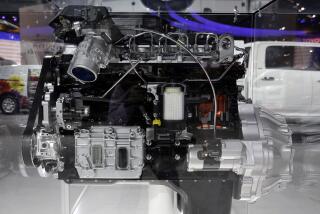Minolta Must Pay Big Award to Honeywell
- Share via
In a decision highlighting some of the sticky issues underlying U.S.-Japanese trade tensions, a federal jury Friday ordered Minolta Camera Co. to pay $96.4 million to Honeywell Inc. for infringing on Honeywell patents on auto-focus technology.
Minneapolis-based Honeywell immediately said it will seek an injunction barring the sale of all Minolta auto-focus cameras in the United States. The company also said it will seek royalties from at least 15 other camera companies--all of them based in the Far East--that it contends are illegally using its technology.
The verdict, which came after a highly technical, four-month-long trial and six days of jury deliberations, could be worth more than $300 million to Honeywell when interest, court costs and revenue from settlements with other camera companies are counted, according to Nicholas Heymann, an analyst with County NatWest Securities.
Yet it also threatens to wreak havoc on the multibillion-dollar U.S. photography business, especially if Honeywell’s request for an injunction is granted. Minolta is the leader in auto-focus cameras, with about 30% of the U.S. market, Heymann said. Minolta’s entire U.S. photo business is worth about $400 million. Neither Honeywell nor any other American company builds auto-focus cameras.
“I’m appalled,” said Willard N. Clark, editor of Photo Business magazine. “The photo industry has been battered (by recession) over the past year, and the last thing we need is this kind of problem. This could drive some of the marginal companies out of business.”
The jury ruled that the infringement was not willful, a decision that shields Minolta from a triple-damages penalty, but that also makes it less likely that the verdict will be overturned on appeal. Minolta said it has not decided whether to appeal.
While the jury found Minolta guilty of infringing on two Honeywell patents, it found no violations on two other patents. It rejected Honeywell’s contention that Minolta had breached a 1979 contract in which it agreed to pay royalties on the Honeywell technology.
American companies often assert that Japanese firms prosper by using American innovations, though in most cases the Japanese use legally licensed technology that American companies decide not to pursue.
U.S. District Judge Alfred M. Wolin said he did not believe that U.S.-Japanese trade friction had a bearing on the case.
“I am confident global issues unrelated to this case played no role in your deliberations,” Wolin told the jury after the verdict.
But John Gilleland, a psychologist with Jury Analysts, a consulting firm that Minolta hired to help it prepare for the trial, said subtle prejudices may have played a roll.
“Unconscious Japan-bashing can be very difficult to avoid,” he said, adding that Honeywell lawyers took every opportunity to highlight the U.S.-Japan issue. “It’s a very difficult time for a Japanese company to be trying a major case in a U.S. court.”
The Associated Press contributed to this story.
More to Read
Inside the business of entertainment
The Wide Shot brings you news, analysis and insights on everything from streaming wars to production — and what it all means for the future.
You may occasionally receive promotional content from the Los Angeles Times.










